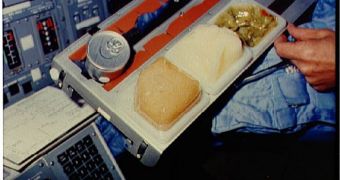According to NASA Space Food Systems Laboratory senior research scientist Maya R. Cooper, one of the greatest challenges the American space agency will have to face before even considering sending humans to Mars is finding a way of feeding the space explorers.
As space agencies around the world are starting to contemplate the idea of sending manned missions to the Red Planet, it is becoming increasingly obvious that the human factor is the most difficult-to-handle of them all, especially when it comes to the crew.
There is no telling how 4 to 8 astronauts will react after being locked together in a crammed space for more than 18 months. In addition to the psychological effects, finding a proper way to keep all of them nourished, healthy, and in top physical shape is also daunting.
While speaking at a meeting of the American Chemical Society, Cooper explained to the audience that NASA is working hard on developing new food technologies that could be used during long-term space exploration flights, Universe Today reports.
The expert also said that the approach used to feed astronauts on the International Space Station (ISS) may not necessarily apply to a mission bound for Mars. In other words, what she was saying was that the particularities of each exploration sortie will become the decisive factor in diet selection.
In addition to the difficulties of preparing and storing nutritious food, experts also have to face the issue of keeping it safe during months of spaceflight. Food packaging, nutrition, weight, and variety are all important things to take into account.
For a 5-year mission to the Red Planet – including 18 months of space travel and 42 months of ground operations – experts at NASA estimate that as many as 7,000 pounds (3.1 tons) of food will be required. The current ration for astronauts in space is just under 4 pounds of food per day.
“That’s a clear impediment to a lot of mission scenarios. We need new approaches. Right now, we are looking at the possibility of implementing a bioregenerative system that would involve growing crops in space and possibly shipping some bulk commodities to a Mars habitat as well,” Cooper said.
“This scenario involves much more food processing and meal preparation than the current food system developed for the space shuttles and the International Space Station,” she told conference attendants.
“The NASA Advanced Food Technology project is currently working to address the issues of food variety, weight, volume, nutrition and trash disposal through research and external academic and commercial collaborations,” the NASA expert concluded.

 14 DAY TRIAL //
14 DAY TRIAL //